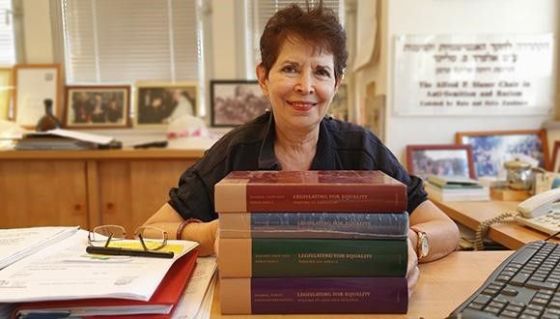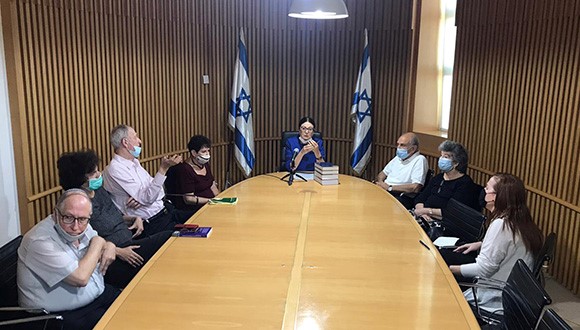
A New Tool for Combating Discrimination
After decade long study, the Kantor Center has published a special book edition on legislation against discrimination and racism around the globe.
The Kantor Center for the Study of Contemporary European Jewry recently completed writing four extensive volumes of legislation covering existing anti-discrimination laws on the grounds of racism, religion and ethnicity in all 195 countries of the world. Entitled “Legislating for Equality – a Multinational Collection of Non-Discrimination Norms.” It is the first time that researchers have mapped, examined and compared policies aimed at eradicating discrimination in each country.
The comprehensive initiative, led by Adv. Talia Naamat, legal researcher at the Kantor Center, involved in-depth examination of the countries’ constitutions, as well as international conventions and agreements. Universities and researchers from around the world contributed. Recognizing the value this work brings to the global stage, former Director-General of UNESCO Irina Bokova wrote the introduction to the volumes published by Brill, one of the world’s leading law book publisher.
From Antisemitic Laws to Racist Laws
“The study was born out of a practical need to combat antisemitism,” says Naamat, the editor-in-chief of the volumes. “We started working on it in 2011, when researchers approached us with questions about antisemitic legislation following a seminar on the subject. We’d receive questions such as where Holocaust denial was allowed and where it was forbidden.” Prof. Dina Porat, Head of the Kantor Center, recalls “One of the researchers mentioned the law in his country, when another researcher jumped in and pointed out that in his country the situation was different.”
The research quickly expanded, “We realized that we needed to review the information in a broader manner, looking at the general prohibition of discrimination and the combatting of all types of racism. Thus we began compiling the relevant constitutional clauses, parts of penal codes as well as the language of specific laws,” explains Naamat.
In the volumes, the authors sorted the countries according to continents. Obtaining the information was more straightforward for some continents than others. The highly organized and digitized nature of the information gathered from European countries made the research easier, while for continents like Africa and Asia they had to win collaborations with universities and other bodies in order to obtain the necessary data, translate the information to English and obtain the required translation certificates. Many of the laws had never before been published in English.
Israel and the World
Legislation, of course, does not necessarily reflect the actual situation on ground. The researchers consulted with annual reports from the U.S. State Department, among others, to assess the situation in each country. “We addressed such discrepancies in the footnotes. For example, if the constitution in a particular country stipulates that every citizen has the right to political organization, but we know the actual situation on ground is catastrophic and that there’s currently a civil war taking place there, then we’d address this in the comments,” notes Naamat.
And what is the current situation here in Israel? “We like to compare ourselves to Europe, and we do operate with a high standard for freedom of expression in Israel. The enforcement, however, is more severe in Europe, and the whole discourse is conducted differently here,” says Naamat. Porat adds, “While calling another person a ‘Nazi’ in Europe is an offence which may lead to punishment, here in Israel a person can use the word [unpunished] from morning to evening. We have this absurd situation whereby we [Israelis] demand that Europeans enforce it, while we do not have a single law on the subject ourselves.”

The Israeli discourse is more open than in Europe – for better or worse
Human Rights Violations Against Witches and Persons with Albinism
Our research showed that culture, form of government and attitudes towards religion greatly influenced legislation. “We were surprised to see that there are countries with harsh realities on ground, but with good constitutions. The constitutions of Saudi Arabia, Libya and Iran, for instance, appear very enlightened. If you had read the constitutions of any of these countries without preexisting knowledge about the country, you could mistake it for being all about equality and solidarity”, says Porat.
The degree of separation between state and religion was also a significant factor. “For example, in Iran where the Sharia law, a religious law, has been incorporated into the country’s otherwise secular laws. Other religious principles can be found, such as permitting the murder of a person who has raped or harmed another person,” notes Porat.
The volume about African countries shows how religion and culture influence legislation, for example through the persecution of witches and albino hunting. “We may expect legislation to be something that represents net justice, while in practice it is a product of what you and I believe and believe in. For example, there are religious principles that contradict human rights and the freedom of religion and worship. We have seen laws prohibiting the persecution of witches and albinos (there are places where being in the possession of an albino person’s limbs is considered a blessing), and the fundamental question arose as to when religious worship should be allowed and when religion violates human rights,” Naamat and Porat explain.

Leave them alone. An albino child anno 2021.
Legislation is Dynamic
The good news is that in most countries of the world laws are constantly being renewed and updated. The circumstances for enacting new laws vary. In 2008, the EU announced that all member states must align and enact anti-discrimination laws, which led to widespread legislation across the continent.
Porat and Naamat point to growing global immigration over the last decade as one of the main influences on changes in legislation: “We observed this in the early 1990s, when a big wave of immigration began. The USSR disintegrated, Germany united, waves of immigrants changed their direction and, and new questions emerged: Who is an immigrant? Who is a refugee? Who is a foreign worker? Who deserves what? The legislation was expanded and many new laws were introduced.”
“As immigration grew, so did racism, discrimination, and harsh expressions. The mass immigration to Germany led to the rise of neo-Nazism and the extreme right, which is actually a counter-reaction of those who ask ‘What about us? You care about the immigrants but what will happen with us?’” says Naamat.
Where Are We Headed?
The situation on ground may not look particularly bright in many places. However, these new books make the information accessible for all, openly presenting what is happening all over the world. The anthology could serve as a source of hope and pave the way for revolutions. “We are offering a tool that allows countries to compare their laws with those of other countries, and improve them. Such activity started as soon as the books were published. The secretary of the Jewish community in Greece received a copy and went on to check the existing laws in Europe against Holocaust denial. He told us that the information helped him promote an amended law in his country. And this will happen in other places,” predicts Porat.
 Israel’s Supreme Court President Justice Esther Hayut receives the four volumes.
Israel’s Supreme Court President Justice Esther Hayut receives the four volumes.
Porat presented the four volumes to Supreme Court President Justice Esther Hayut during a special visit to the country’s highest judicial officer. Chief Justice Hayut congratulated Prof. Porat on the academic achievement, noting that it adds an important dimension to the war on racism and discrimination against various peoples and groups in the world.
The meeting was also attended by former president of Tel Aviv University Professor Emeritus Yoram Dinstein who chaired the scientific committee that accompanied the work; former Deputy President of the Supreme Court Justice Prof. Elyakim Rubinstein and Supreme Court Justice Daphne Barak-Erez who were members of the accompanying committee; Adv. Talia Naamat and Celia and Jack Michonik who generously supported the work.
“Thank you, Your Excellency, on behalf of everyone present, for the time you have devoted to us and for the interest which you have shown our work. We hope that these volumes will contribute, albeit modestly, to the fight against racism-based discrimination in the world – an evil which is present in many countries and societies. And that’s consistent with the spirit of the values that our Supreme Court, of which we are proud, leads in your leadership,” said Prof. Porat excitedly.
Featured image: Prof. Dina Porat with the four volumes
